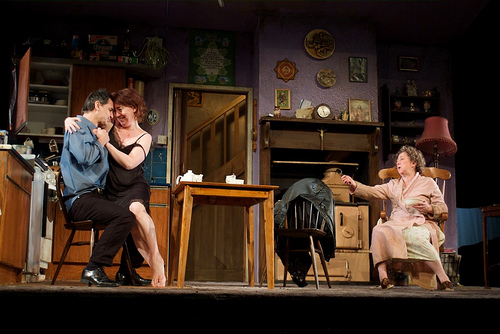Theatre Review – The Beauty Queen of Leenane
★★★★☆
Royal Lyceum Theatre: February/March 2010
By Thom Dibdin
Hilarious, dark and utterly brutal, playwright Martin McDonagh’s prize-winning look at late 20th century life in rural Ireland is given a most beguiling outing at the Royal Lyceum, under Tony Cownie’s direction.
Here, on one level, are all the clichés of the genre. A lonely house in the back-end of beyond, the spinster Maureen wasting away her life looking after Mag, he curmudgeonly 70 year-old mother; the gentle tongue-tied labourer Pato, who hates his life on the building squads in England, and his feckless brother Ray.
And on this level – in Janet Bird’s mundane kitchen set – a strong and impressive four-strong cast create all the resonance’s of the time while teasing out McDonagh’s wordplay and the Father Ted-level comedy which broadens out the basis beyond mere cliché.
Cara Kelly is in superb form as Maureen, battling to create her own life in her mother’s shadow, with her two sisters long since married off to start their own lives. Nora Connolly can afford to play it more for the comedy as Mag, demanding more cups of tea and moaning about lumps in the Complan.
At first the brothers seem to be utterly peripheral. Dylan Kennedy is quite the arrogant layabout as Ray, who disturbs his consumption of Australian daytime soaps to bring an invite to Maureen. It is to a party where she will meet John Kazek’s Pato, who comes back afterwards for cups of tea – and more.
Suddenly the brothers – or at least what they represent in terms of the world encroaching on Maureen and Mag – come centre stage.
Together they begin to provide a way for either of the women to escape the situation they have built for themselves.
Nor is that all there is. Not by a very long way. Just as the kitchen set is raised and isolated in an open, darkened stage which hints at the beauties of the hills beyond, so there are dark and brooding secrets to be found in the back-stories of its inhabitants.
Suddenly the fluffy, slightly patronising view of the hardships of rural living is put into proper focus. This is not about whether to leave or not, even though that is up to debate, it is about the pressures on those who can’t or won’t. Nor it is about laughing at Mag’s more vile habits, no matter how much comedic licence they contain, it is about realising exactly what the fallout from those habits will be.
In many ways, McDonagh is a conventional writer. What makes his writing great is the way he turns the minutiae of normality into a horror show of lies and half-truths. Be warned, there is one moment of such repulsion that you would be foolish not to look away – but that does not stop this being a thoroughly satisfying production that does justice to a deceptively simple play.
Run ends 13 March





















